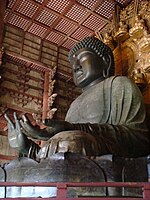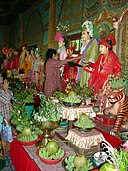|
Four Heavenly Kings
  The Four Heavenly Kings are four Buddhist gods or devas, each of whom is believed to watch over one cardinal direction of the world. The Hall of Four Heavenly Kings is a standard component of Chinese Buddhist temples.
NamesThe Kings are collectively named as follows:
Individually, they have different names and features.
MythologyAll four Kings serve Śakra, the lord of the devas of Trāyastriṃśa. On the 8th, 14th and 15th days of each lunar month, the Kings either send out emissaries or go themselves to inspect the state of virtue and morality in the world of men. Then they report their findings to the assembly of the Trāyastriṃśa devas. On the orders of Śakra, the Kings and their retinues stand guard to protect Trāyastriṃśa from another attack by the Asuras, which once threatened to destroy the realm of the devas. They also vowed to protect the Buddha, the Dharma, and the Buddha's followers from danger. In Chinese Buddhism, all four of the heavenly kings are regarded as four of the Twenty Devas (二十諸天 Èrshí Zhūtiān) or the Twenty-Four Devas (二十四諸天 Èrshísì zhūtiān), a group of Buddhist dharmapalas who manifest to protect the Dharma.[1]  According to Vasubandhu, devas born in the Cāturmahārājika heaven are 1/4 of a krośa in height (about 750 feet tall). They have a five-hundred-year lifespan, of which each day is equivalent to 50 years in our world; thus their total lifespan amounts to about nine million years (other sources say 90,000 years).  The attributes borne by each King also link them to their followers; for instance, the nāgas, magical creatures who can change form between human and serpent, are led by Virūpākṣa, represented by a snake; the gandharvas are celestial musicians, led by Dhṛtarāṣṭra, represented with a lute. The umbrella was a symbol of regal sovereignty in ancient India, and the sword is a symbol of martial prowess. Vaiśravaṇa's mongoose, which ejects jewels from its mouth, is said to represent generosity in opposition to greed.
Gallery
Popular culture
See also
References
External linksWikimedia Commons has media related to Four Heavenly Kings.
|


















